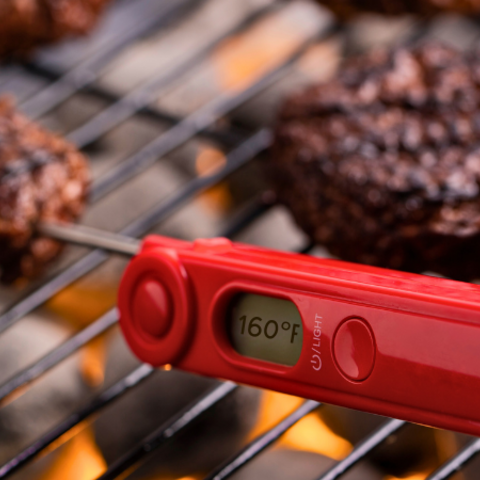
Many people don't know the answers to the 8 questions on this food safety quiz. Do you?
Question 1: How long will food stored constantly at 0° F remain safe?
- 1 to 2 years
- 5 years
- Indefinitely
Question 2: What temperature is recommended for your refrigerator?
- 50° F
- 45° F
- 40° F
Question 3: Since only the inside of melons (such as watermelon) is eaten, does their outer rind need to be washed?
- Yes
- No
Question 4: If a food tastes OK, is it safe to eat?
- Yes
- No
- Maybe
Question 5: Should you wash raw meat and poultry before preparing it?
- Yes
- No
Question 6: How long should you store leftovers in the refrigerator?
- 3 to 4 days
- 1 to 2 weeks
- 3 weeks
Question 7: If you've never gotten sick from food that you prepare — even though you don't follow "food safety guidelines" — could it make someone else sick?
- Yes
- No
Question 8: For best quality, how soon after purchase does the U.S. Department of Agriculture recommending using eggs?
- 1 week
- 3 to 5 weeks
- 2 to 3 months
Answers:
- 3. Indefinitely. Food will be safe indefinitely at 0° F though the quality will decrease the longer it is in the freezer.
- 3. 40° F. Keep your refrigerator at 40° F or below. Buy an inexpensive appliance thermometer for both your fridge and your freezer; check them often.
- 1. Yes. Bacteria present in soil can contaminate the outside of melons. When melons are cut, these bacteria are transferred to the part we eat.
- 3. Maybe. However, don't count on your taste, smell, or sight to tell you if a food is safe to eat. Even if tasting could tell ... why risk getting sick? A "tiny taste" may not protect you. A small amount of some bacteria, such as of E. Coli, could make you sick. When in doubt, throw a food out.
- 2. No. Washing increases the danger of cross-contamination by spreading bacteria present on the surface of meat and poultry to nearby ready-to-eat foods, kitchen utensils and counter surfaces. Cooking meat and poultry to the recommended internal temperature will make them safe to eat.
- 1. 3 to 4 days. Use leftovers within 3 to 4 days. Discard any food left at room temperature for more than 2 hours or 1 hour if the temperature is above 90° F. Place food in shallow containers and refrigerate at 40° F or lower or freeze at 0° F or lower. Frozen leftovers will taste best and be at best quality if eaten within about 3 months.
- 1. Yes. Some people have a greater risk for foodborne illnesses. A food you safely eat might make others sick. People with a higher risk for foodborne illness include infants, pregnant women, young children, older adults, people with weakened immune systems and individuals with certain chronic diseases.
- 2. 3 to 5 weeks. Store eggs in their original carton in the coldest part of the refrigerator, but not on the door when they are more susceptible to temperature changes as the door opens and closes. Though the "sell by" date will probably expire during that time, the eggs will still be safe to use.
Sources:
Freezing and Food Safety, Food Safety and Inspection Service (FSIS) and U.S. Department of Agriculture (USDA)
Fruit and Vegetable Safety, Foodsafety.gov
How long can you store eggs in the refrigerator?, U.S. Department of Agriculture (USDA)
Leftovers and Food Safety, Food Safety and Inspection Service (FSIS) and U.S. Department of Agriculture (USDA)
Refrigeration and Food Safety, Food Safety and Inspection Service (FSIS) and U.S. Department of Agriculture (USDA)
Washing Food: Does it Promote Food Safety?, Food Safety and Inspection Service (FSIS) and U.S. Department of Agriculture (USDA)
This article was originally developed by Alice Henneman. It was reviewed and updated in 2025.
Tags:



